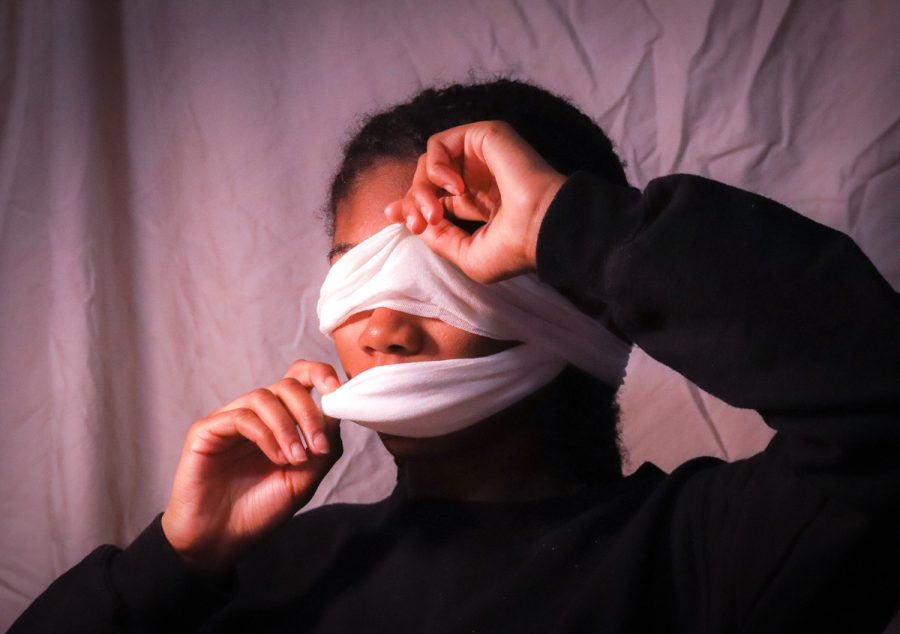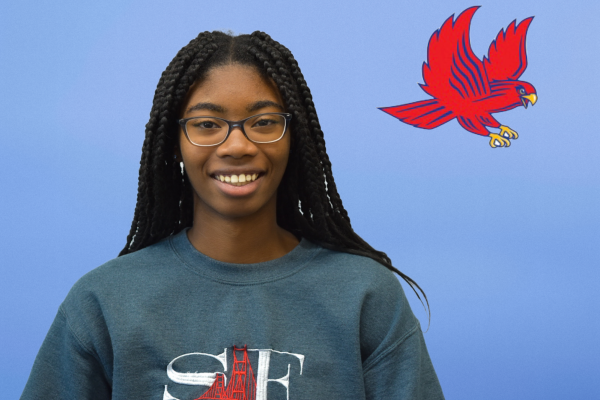Alone in a Crowd: Being a Black Student at a Predominantly White School
In this photo, I chose to cover my eyes and mouth with a white cloth to represent the isolating experiences I’ve had at predominantly white schools. The cloth symbolizes how I have been held back and mistreated by some of my white peers and teachers, and my hands peeling back the cloth is me bravely stepping forward and telling my story for the first time.
April 12, 2023
I am a Black student who has attended predominantly white schools my entire life.
At times, this has been a very isolating experience, but also one that has undeniably shaped me into the person I am today. Of course, I am thankful for the quality education I have received at these schools, but these past 11 years of school have definitely had their issues. I often struggle to verbalize the challenges I went through as a Black student at a primarily white school, especially to my white friends who can’t fully grasp what I went through.
So, after much hesitation and rewritten drafts, I’ve compiled a list of the major challenges I’ve gone through as a Black student at predominately white schools, and how I have worked through them.
The Feeling of Inferiority
The first time I really felt inferior to my white classmates was in second grade.
I had just had my hair straightened, which was a rare occurrence, as I usually wore my hair in braids or in a natural style. So, I was excited to show my friends my new hairstyle and walked into school with as much confidence as my seven-year-old self could gather.
That confidence was immediately shattered when a classmate walked up to me and petted my hair as if I was a stuffed animal or a puppy. She continued to pet my hair and eagerly told me how soft it was as I stood uncomfortably. I asked myself why and how she could treat me in such a disrespectful manner. I never gained the courage to tell her to stop.
It was from this moment onwards that I understood that some of my classmates did not see me as a peer or a friend, but as something of a novelty.
This lingering feeling of inferiority continued into middle school. As I became more aware of race and what racism was, I picked up on the cruel nature of the offhand compliments I would receive.
I remember my sixth grade math teacher giving out a test at the beginning of the year to gauge where everyone was skills-wise. When she finished grading the tests and was passing them back, she told me just how surprised she was that I did well on the test. As she placed the packet on my desk and eyed me up and down, it became clear that she wasn’t really impressed by my mathematical abilities, rather that a student that looked like me had done so well.
This wasn’t the only time this teacher would react so ignorantly to the scores I earned on tests, and she wasn’t the only teacher I encountered that did this. Over time, I thought less of myself as a student because the expectations set for me were so low.
I do want to acknowledge that lots of students have felt inferior in the classroom, and that’s an uncomfortable feeling to have. I was the only Black student in my math class, and she never communicated with my white classmates in that way. I knew she saw my skin color as some sort of barrier that would supposedly make me less intelligent than my peers.
I ultimately overcame this challenge when I graduated from middle school. Leaving the environment that had caused me to become so unsure of myself was the only way to grow, and coming to La Salle gave me the perfect opportunity to do so.
I found a strong and supportive community at La Salle that helped me navigate my feelings. Of course, I still face times in which I am made to feel less than others, but I’m learning to brush off those encounters and not let them affect me so deeply.
Dealing With Microaggressions
For those not familiar with the term, microaggressions are defined as “a subtle but offensive comment or action directed at a member of a marginalized group, especially a racial minority, that is often unintentionally offensive or unconsciously reinforces a stereotype.”
As a student at schools where next to no one looked like me, I’ve dealt with my fair share of microaggressions. Many peers and teachers might have had positive intentions with what they were saying, but they possessed zero awareness of how their comments would be received.
In many cases where I’ve experienced a microaggression, the person I was talking to didn’t understand how their comments could possibly be harmful. They haven’t been able to see things from another person’s perspective, and therefore feel no problem with their comments. More recently, this has been known as implicit bias, which is bias that is unintentional, but ultimately affects decisions and actions.
For example, I’ve had classmates tell me — on multiple occasions — that I don’t act Black. That was truly a confusing statement, as I didn’t remember receiving a handbook on how Black people act when I was born. Teachers would tell me I sounded so articulate as if it was impossible for me to write well and be a talented speaker. Classmates would prod me to answer where I was really from as if I wasn’t as American as they were.
I could go on and on about the microaggressions I’ve faced at school, and unfortunately, I know that many students of color at La Salle and other predominantly white schools can relate to me. These seemingly small and unimportant instances of racism are passed over so quickly because they seem harmless when, in reality, it is like death by a thousand cuts.
One comment here or there will not break a person, but imagine years of offhanded compliments, unsettling looks in the hallways, and cruel comments passed off as jokes. Years of something so small can suddenly turn into a much larger and more persistent issue.
All Eyes On Me
Despite a life-long love for history, I’ve always kind of dreaded history classes. Whenever the curriculum reaches the section on African American history or the Civil Rights era, I prepare myself for classes full of discomfort.
I know that as soon as my teacher mentions slavery, the Jim Crow era, or something similar, the eyes of my classmates will inevitably turn toward me, only to quickly dart away when I notice them staring. It almost feels like there is some sort of expectation for me to say something powerful or react strongly. I can’t say for sure, but it seems that my classmates turn to me either out of pity or out of curiosity.
I understand that the majority of my classmates, if not all of them, have no ill intention behind their stares. Regardless, the feeling of discomfort is still there.
This same aura of discomfort occurs when the n-word is in a book or passage being read. It’s like a switch is flipped and my teachers and peers suddenly have the overpowering urge to look directly at me, as if searching for guidance. Although these encounters are awkward, I try not to dwell on them too much, and often joke about what happened with my close friends. Humor can be an easy escape for me when faced with tense situations, and it has given me an outlet to express my feelings.
This experience mostly occurred during my middle school years, and I’ve found that the administration and teachers at La Salle have been very respectful regarding this topic.
–
It may seem from this article that my time in school has been less than favorable or otherwise filled with terrible encounters. However, I would say the majority of what I have experienced at school has been overwhelmingly positive and constructive. I have met my closest friends at school and shared my most treasured moments at school retreats, track meets, and theater events.
La Salle’s recent efforts to become more inclusive and aware of the issues faced by marginalized groups have been effective and necessary. Although I haven’t felt a significant change in the culture at La Salle and have experienced numerous microaggressions, some members of the community have made beneficial efforts at changing their words and actions to be more inclusive.
My hope is that you don’t see this article as an attack on the schools I’ve attended or an attack on white people. In fact, that couldn’t be further from my intent.
I want this piece to serve as a way to form understanding between the various communities that exist not only at La Salle, but also in our world. And with that understanding, it is my firm belief that we, as a community, can work to eliminate the discrimination and hostility that still dwells inside our society.







PC • Nov 14, 2024 at 5:20 pm
Thank you so much for sharing your story that, unfortunately, so many Black kids across the country go through. So excited for you to use your experiences to continue to be a voice for the culture. I’d love to quote this article in my Capstone project in my graduate program if you’re comfortable with it! Sending strength and support from Chicago.
Chris Krantz • May 8, 2023 at 3:53 pm
Jasmine, thank you for putting in the time and effort to write such a thoughtful article. I especially appreciate your courage, your willingness to write publicly about your personal experiences. We’re better for it.
Tom McLaughlin • Apr 28, 2023 at 11:10 am
Thank you so much, Jasmine, for writing this essay. (And your photograph is stunning.) Through it, you invite our community to look more closely at our siblings, ourselves. You reflect on the positive you have experienced as part of the La Salle family, and you encourage us to learn and grow. I feel grateful that, together, we help each other – at least many of us – feel a sense of belonging. I also take away a desire to pay more attention to my own unconscious biases and to whether I am hurting others with microaggressions. Thank you for helping me to continue becoming a beautiful human being.
Rachel Raphael • Apr 13, 2023 at 9:14 pm
Jasmine,
Thank you for sharing this important and moving personal article. While many white people know the terms “implicit bias” and “microaggression,” it’s usually from a very academic standpoint. Hearing about your personal experience makes it real and palpable and forces the reader to self-reflect on how they, too, have participated in making black students and humans feel disrespected and excluded. Thank you for opening our eyes. To boot, you are an excellent writer! I hope to hear more from you before the end of the year.
Aaron Hollingshead • Apr 13, 2023 at 9:09 am
Love this piece! Kudos & thank you.
Jesse Keyes • Apr 12, 2023 at 10:55 pm
Well-written, honest, thoughtful piece. Love how it ends on a positive note – it sneaks up on the reader. I’m a white man and the father of a white student at La Salle. As a white kid growing up I always secretly envied and idolized black people for being outsiders…or for feeling like outsiders in a white society, because that gave them authenticity. As an artist I felt like I could relate, at least on that one tiny level. The insider perspective might be easier and safer, but the courage and insight to gain from the minority side, in any society, strikes me as profoundly more meaningful. Thanks for sharing your experience.